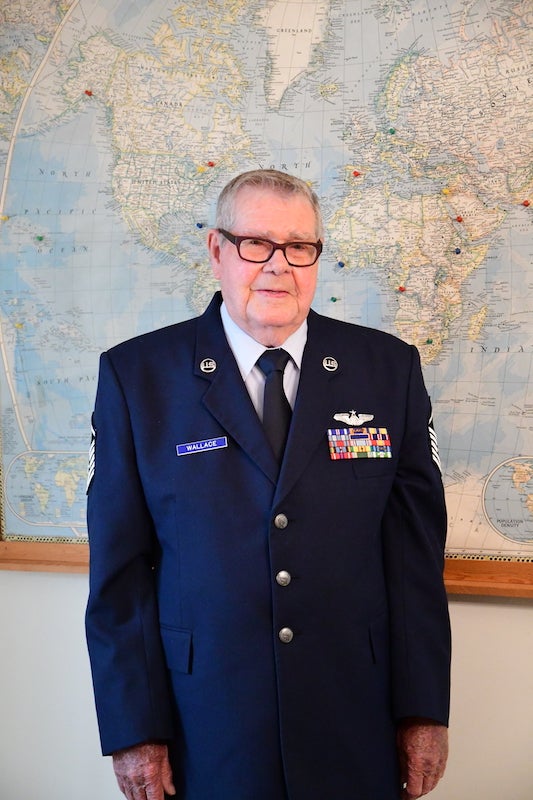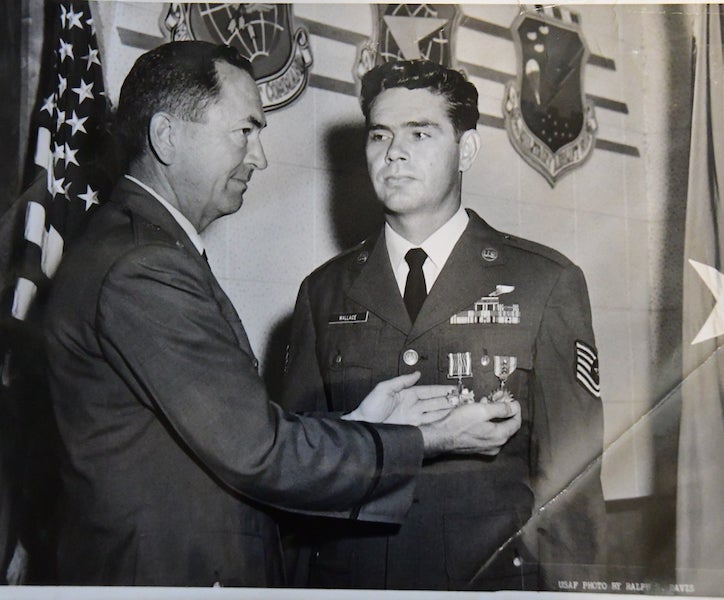
Story and photos by JOYANNA LOVE
Aubry Lee Wallace was six years old when he knew he wanted to join the U.S. military.
The year was 1941, and World War II was underway.
“On Dec. 7, the Japanese bombed Pearl Harbor,” Wallace said. “From that time on, I hated all enemies of the United States, and I wanted to fight them.”
Looking back on that time, he said the attack “was so shocking to people. People don’t realize how it was.”
He said Birmingham had blackout drills in preparation for if there was ever an attack.
“Everybody was scared to death,” Wallace said. “There was no way the Japanese could get that far inland to come to Alabama, but people were still afraid of it.”
His eagerness to serve was met with some challenge as he tried to enter the military when he was underage — twice.
At 15, Wallace joined the National Guard.
“In June of that year, 1950, is when the Korean War started,” Wallace said. “When the war started, the Guard knew they had a bunch of kids in there.”
He received an honorable discharge because he was too young to serve.
The following year, Wallace tried joining the Army.
“I went and lied about my age again, and I joined the Army,” Wallace said. “I went through boot camp … Then my daddy got me out again. He didn’t want me going to Korea.”
Wallace had taken a train to boot camp in California.
Having been born in Stanton in 1935, he enjoyed getting to see other parts of the country.
Finally at the age of 17, Wallace begged his father to sign permission for him to join.
“I told my dad, ‘I want you to sign for me to go into the service. I want to join the Air Force,’” Wallace said. “He didn’t really want to. I said ‘If you don’t do it, Dad. I’m going to leave home. I’m going to get in some way.’”
Eventually, Wallace convinced his father to sign the necessary papers for him to serve in the Air Force.
Wallace was accepted as a supply major.
“The Korean War was still going on when I joined the Air Force,” Wallace said.
He completed his training in Texas.
“My first duty assignment was to Maxwell Air Force Base down in Montgomery,” Wallace said.
It was during this assignment that he met his wife, Shirley.
“We were both kids,” Aubry said. “I was only 17 years old. She was 15 years old when we got married.”
“In just a few months, I was 16,” Shirley said.
The couple has now been married for 65 years and will celebrate their anniversary in July.
“We proved everybody wrong that said it wouldn’t last,” Aubry said.
Two weeks after his wedding, Wallace was reassigned to Alaska. Since Aubry did not have a high enough rank for Shirley to go with him, she stayed behind.
Aubry was on a ship headed to Alaska when he received news that the Korean War had ended.
After 18 months in Alaska, Aubry was stationed in Texas. This time Shirley was able to join him.
In 1958, Aubry was sent to Hawaii. Shirley was unable to go because she was pregnant with their third child at the time and was not cleared to travel until the child was six weeks old.
He was stationed in Hawaii for three years.
“When I was in Hawaii was when they first came out with computers, and we had to transfer all of our records … our computer was as big as this house,” Aubry said. “You walked into it, you had to walk into the computer, and you had to put on a white jacket go through two sets of doors and be blown off, no dust could go in there.”
Next, he was stationed in Louisiana. This is where he was during the Cuban Missile Crisis.
“Everyone thought we were going to go to war,” Aubry said.
While war with Cuba did not happen, the United States became more involved in Vietnam.
“We had been over there for a long time supporting the French, when the French was over there supporting the Communists,” Aubry said.

In 1963, he was accepted for flight status as an aircraft load master on the C-130. An aircraft load master is responsible for everything in the plane behind the cockpit.
“My primary job was to make sure that aircraft was in balance,” Aubry said. “People don’t understand this about aircraft. An aircraft has a center of gravity and everything in that aircraft has to be a balanced to that center of gravity to the plane or they won’t fly.”
The plane was also used to drop paratroopers.
He was a part of a unit sent to Tachikawa in Japan, which served as a staging point for flights into south Vietnam.
“One of the things, I really remember about flying out of Tachikawa is the air base was right in the middle of the city,” Aubry said.
He also worked on an airplane that was used as an ambulance.
Once bases were established in Vietnam, Aubry and his team began flying to those air strips. During this part of his career, he would land on each of them that had been established.
“There wasn’t a month from November of 1965 til I retired in 1972 that I wasn’t in Vietnam at some time or another,” Aubry said.
Shirley said this made for a bit of a “lonely life” for her.
“I had my kids, but he was gone all the time,” she said.
However, she said she did enjoy the opportunities to see and experience new places each time the family moved.
In 1966, Aubry cross trained on the C-131 and was stationed in California. He was on missions along the Vietnam-Cambodian border to resupply bases by dropping supplies with parachutes.
“We resupplied 20 bases along that border,” he said. “We had a 90% recovery rate, and that’s a pretty good recovery rate when you drop your cargo from an airplane.”
It was because of this mission that he received the Distinguished Flying Cross.
While there, he became the chief of training. Andrews Air Force Base invited some of those from the California base to a training at LAX airport to train for serving on Air Force One.
He said he was never called on to serve on Air Force One, but he was prepared anyway.
In 1968, he was asked to be a part of Bob Hope’s Christmas tour.
“We went all over southeast Asia, starting at midway island,” Aubry said.
In 1969, he requested being stationed in Charleston, South Carolina.
“I knew I only had 18 months left and I wanted to get closer to home (Alabama) for my retirement,” Aubry said. “… The last two missions I had with the Air Force I went around the world.”
He retired at the age of 36 as a Master Sergeant E-7 and moved his family back to Chilton County.
During his military service, Aubry Wallace was awarded the Distinguished Flying Cross, Air Medal with Five Oak Leaf Clusters, Air Force Commendation Medal, Air Force Outstanding Unite Award, Good Conduct Medal (one for every 25 combat support missions), National Defense Service Medal, Armed Forces Expeditionary Medal, Vietnam Service Medal, Air Force Longevity Service Medal, Air Force Presidential Unite Citation, Combat Readiness Ribbon, Small Arms Expert Marksmanship Ribbon and Master Aircrew Wings.
When he was stationed in California, Aubry pastored a church in addition to serving with the Air Force to fill in after the pastor had left. In 1978, he attended seminary in Louisiana.
In 2005, Aubry Wallace was invited to come and pray for the U.S. Senate and House of Representatives.
Although he never became a pilot in the Air Force, he did earn his pilot’s license years later at the Chilton County Airport, under the direction of Billy Singleton. He took his first solo flight on May 11, 2001.
Aubry and Shirley had three sons: Mickel, Kurt and Timothy and one daughter Windy Kay (Wallace) Barr. All three of the Wallace sons went on to serve in the military. The oldest Mickel joined the Navy when he grew up and died in service to his country.
